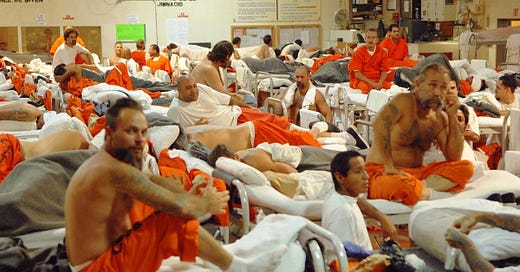U.S. Paying to House Foreign Criminals as Biden's Federal Prison System Collapses
Send Foreign Inmates Back and Punish Nations That Refuse to Incarcerate Their Own
By Richard Luthmann
The Federal Bureau of Prisons (BOP) is closing seven facilities, citing a crumbling infrastructure, a $400 million budget shortfall, and chronic staffing shortages. Yet amid these cuts, the U.S. continues to pay billions annually to house thousands of foreign nationals in federal prisons—an unnecessary strain on a system already teetering on collapse.
Key Facts:
Seven facilities are closing, displacing 400 federal workers.
Roughly 20,000 foreign nationals occupy federal prison cells.
Housing foreign inmates costs taxpayers over $700 million annually.
Proposed penalties include fines, foreign aid reductions, and tariffs on key exports.
Prison Closures Highlight Systemic Issues
Among the facilities slated for closure are FCI Dublin in California, plagued by allegations of staff-on-inmate abuse, and two federal prison camps in Duluth, Minnesota, and Pensacola, Florida. These closures will eliminate 326 positions, with hundreds of workers facing “disruptive relocations” or job loss.
The closures come as staffing shortages across the federal system force employees to work mandatory overtime in unsafe environments. Meanwhile, foreign nationals—many convicted of drug offenses and other crimes—make up roughly 20% of the federal inmate population.
“This is unacceptable,” said a corrections officer from FCI Oxford, one of the satellite camps set to be deactivated. “Why are we footing the bill for foreign criminals when we can’t even fund our own prisons properly?”
Deport Foreign Inmates Now
The U.S. spends an average of $37,000 annually per federal inmate. With roughly 20,000 foreign nationals incarcerated, the federal government is wasting over $700 million a year on non-citizens who do not belong in American prisons.
“It’s time to deport these inmates back to their home countries,” said a prison advocate. “American taxpayers should not bear the burden of housing foreign criminals while our prison system collapses.”
The source added that if countries refuse to incarcerate their nationals for the remainder of their sentences, the U.S. should fine them and deduct the costs from foreign aid packages.
“We’re giving away billions in foreign aid while housing their criminals. Enough is enough,” the prison advocate said.
Punitive Measures for Non-Compliant Nations
Experts suggest additional punitive measures for nations unwilling to cooperate, including imposing tariffs on key exports such as electronics, textiles, or agricultural goods.
“On Day 1, I will launch the largest deportation program of criminals in American history,” President-Elect Donald Trump said at a rally in Pennsylvania the day before the election. “We’re going to get them out. We have to. Dwight Eisenhower has the record. … But we’re going to unfortunately beat the record.”
Trump was referring to a program under President Eisenhower in 1954 dubbed “Operation Wetback,” a federally led effort to remove Mexican immigrants illegally living in the U.S. (The term “wetback” is a slur applied to Mexicans who swam or waded across the Rio Grande.)
The federal government claimed to have forced as many as 1.3 million people to return to Mexico. Historians have disputed that figure, but nonetheless, it is the benchmark that Trump has vowed to exceed.
A proposed tariff system would penalize countries proportionally based on the number of inmates they fail to repatriate. For example, nations with the highest numbers of incarcerated nationals—like Mexico, Honduras, and the Dominican Republic—would face the steepest penalties.
Union Outcry Amid Closures
The BOP’s closures have sparked a backlash from union leaders who warn that the agency’s inability to house inmates safely will worsen conditions for staff and the public.
“By closing these facilities, the Bureau is effectively consolidating foreign inmates into already overcrowded prisons,” a union official said. “It’s a recipe for disaster.”
Union officials argue that deporting foreign inmates would immediately reduce overcrowding, alleviate staffing pressures, and free up funds for infrastructure repairs and employee retention.
Systemic Failure: FCI Dublin’s Dark Legacy
The permanent closure of FCI Dublin underscores the systemic decay of federal corrections. Once a model facility, Dublin became notorious for a staff abuse scandal and deteriorating conditions.
Despite its temporary closure earlier this year, a security review revealed repair costs too high to justify reopening. Critics argue that this failure reflects years of neglect, worsened by the financial burden of housing foreign inmates.
“Dublin is a symbol of what’s wrong with our federal prison system,” said Yale Law School Professor Judith Resnick. “We’re spending money on the wrong priorities, and the whole system is suffering as a result.”
Budget Shortfalls and Missed Opportunities
The BOP faces a $400 million funding gap exacerbated by inflation and a 5.2% pay raise for federal employees. Yet despite this shortfall, the U.S. continues to absorb costs associated with incarcerating foreign nationals who should be serving time in their own countries.
“The federal government must prioritize funding for American needs, not foreign criminals,” said another union official. “We’re hemorrhaging resources on inmates who have no business being here.”
A Call to Action
With seven facilities closing, hundreds of jobs on the line, and federal prisons overcrowded with foreign inmates, the time for action is now. Advocates are calling on President-elect Donald Trump to deport all foreign inmates and impose severe penalties on non-compliant nations.
“It’s simple,” said the union official. “If their countries won’t incarcerate them, we’ll take the money out of their aid or hit their exports. American taxpayers shouldn’t foot the bill for their crimes.”








